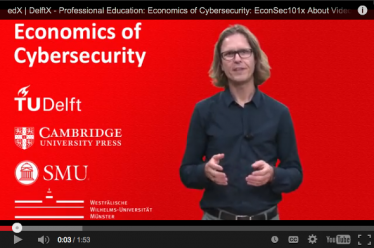Economics of Cybersecurity MOOC

Security economics is a thriving research discipline, kicked off in 2001 with Ross Anderson’s seminal paper. There has been an annual workshop since 2002. In recent years there has also been an effort to integrate some of the key concepts and findings into course curricula, including in the Part II Security course at Cambridge and courses at SMU and the University of Münster.
We are pleased to announce that on 20 January 2015, we will launch an online course on the Economics of Cybersecurity, as part of edX Professional Education. The course provides a thorough introduction to the field, delivered by leading researchers from Delft University of Technology, University of Cambridge, University of Münster and Southern Methodist University.
The course will provide you with the economic concepts, measurement approaches and data analytics to make better security decisions, as well as understand the forces that shape the security decisions of other actors in the ecosystem of information goods and services. It covers five main areas:
-
Introduction to key concepts in the economics of cybersecurity. Here, we provide an overview of the properties of information goods and how this shapes the security in these markets. -
Measurements and empirical research into security issues, decisions and incentives of actors. We analyze data on security incidents in different markets, as well apply economic concepts to explain the strategies of attackers and defenders. -
Economics of information security investment. We discuss and apply different economic models that help determine the costs and benefits of security investments. -
Market failures and policy interventions. We discuss available economic tools to better align the incentives for cybersecurity, including better technologies, security metrics, cyber insurance and risk transfer, information sharing, and liability assignment. -
Human behaviour. We explore the lessons from behavioral economics to understand the heuristics and biases of actors when they diverge from what is considered rational behaviour in conventional economic theory.
After successfully completing this course, you will be able to position yourself as a vital subject matter expert regarding the economic drivers that influence cybersecurity. The e-learning course and case studies provide a solid fundamental understanding of the economics of cybersecurity as discipline. We believe these new resources will help to raise the awareness among those of you in the profession today -as well as those of you with a future in cybersecurity – about the role that you can play in helping us to ensure a more secure society.
For more details about the course content and cost, as well as registration, please visit the website:
https://www.edx.org/learn/cybersecurity/delft-university-of-technology-cyber-security-economics
Please note that this course is designed as part of edX’s professional series, so it’s targeted at executive education. We also plan to offer a more traditional MOOC covering these topics but geared toward graduate students and researchers later next Spring.
We hope you will join us!

